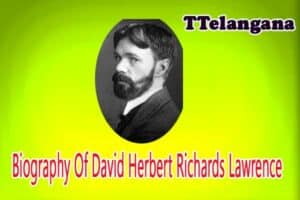Biography Of David Herbert Richards Lawrence
David Herbert Richards Lawrence, known simply as D.H. Lawrence, was an influential and controversial English writer, poet, essayist, and literary critic. Born on September 11, 1885, in Eastwood, a small mining town in Nottinghamshire, England, Lawrence’s life and work were shaped by the industrial environment, class struggles, and the stifling societal norms of his time. His works often delved into themes of human relationships, sexuality, modernity, and the connection between man and nature.
Early Life and Education:
David Herbert Lawrence was the fourth child of Arthur John Lawrence and Lydia Beardsall. His father was a coal miner and his mother was a former schoolteacher. Despite their working-class background, the Lawrence family valued education, and young David was encouraged to read and explore his interests from a young age. Lawrence’s mother, Lydia, played a significant role in nurturing his love for literature and the arts.
Lawrence attended the local Beauvale Board School and later won a scholarship to Nottingham High School, where his academic abilities began to flourish. He was a voracious reader, and his love for books eventually led him to pursue a career as a writer. In 1906, he won a scholarship to study at University College Nottingham (now the University of Nottingham). During his time there, he became friends with fellow writer and poet Jessie Chambers, who had a profound influence on his early works.
Early Writings and Travels:
In 1908, Lawrence’s first significant piece of fiction, “A Prelude,” was published in the English Review. He taught at Davidson Road School in Croydon, London, and it was during this time that he began to experiment with writing more extensively. His first novel, “The White Peacock,” was published in 1911, but it received mixed reviews and limited attention.
In 1912, Lawrence met Frieda Weekley (née von Richthofen), the wife of one of his college professors. Frieda was a German aristocrat, and her marriage was unhappy. Despite the disapproval of society, Lawrence and Frieda fell in love, and they eloped to Germany in 1912, getting married two years later after Frieda’s divorce was finalized. Their relationship and subsequent travels became a significant inspiration for Lawrence’s later works.
Biography Of David Herbert Richards Lawrence
Major Works and Literary Style:
Throughout his life, D.H. Lawrence produced a considerable body of work, including novels, short stories, poems, plays, essays, and travel writings. Some of his most notable novels include:
“Sons and Lovers” (1913): Considered one of his most autobiographical works, the novel explores the complex relationships between a young man, Paul Morel, and his mother.
“The Rainbow” (1915): This novel faced censorship and controversy due to its explicit depiction of sexuality and was banned in the UK for a time.
“Women in Love” (1920): A sequel to “The Rainbow,” it delves into the lives and relationships of the Brangwen sisters.
“Lady Chatterley’s Lover” (1928): Perhaps Lawrence’s most famous and controversial work, explores the passionate affair between an upper-class woman and her gamekeeper, challenging societal norms and censorship laws.
Lawrence’s literary style was characterized by vivid and descriptive language, as well as an exploration of human emotions, instincts, and sexuality. His writing often combined elements of realism, symbolism, and psychological insight, making his works both powerful and thought-provoking.
Later Life and Legacy:
In the 1920s, Lawrence’s health began to decline due to tuberculosis, and he spent much of his later life traveling in search of a climate that would alleviate his illness. He and Frieda lived in various locations, including Italy, Sri Lanka (then Ceylon), Australia, New Zealand, and the United States. These travels and experiences greatly influenced his later works.
Despite the controversy surrounding his writings, Lawrence gained recognition and acclaim during his lifetime. However, his works were not fully appreciated until after his death. He passed away on March 2, 1930, in Vence, France, at the age of 44.
After his death, Lawrence’s reputation as a significant literary figure grew, and he is now considered one of the most influential writers of the 20th century. His works continue to be studied and adapted, and he is remembered for his exploration of human consciousness, the impact of industrialization on society, and the complexities of human relationships.
Tags: a biography of henry david thoreau, biography of richard henry lee, biography of Larry David, biography of richard harris, biography of Richard Long, David Herbert Lawrence, David h Lawrence writer, David herbert donald, d h Lawrence bio, d. h. Lawrence biography, herbert lawrence David (author), david lawrence bio, g. Harvey biography, herbert william richards, biography d h Lawrence, herbert b. Leonard, David herbert lawrence biography, Lawrence Lawrence o Richards obituary, Lawrence o Richards, biography of David Herbert Lawrence
